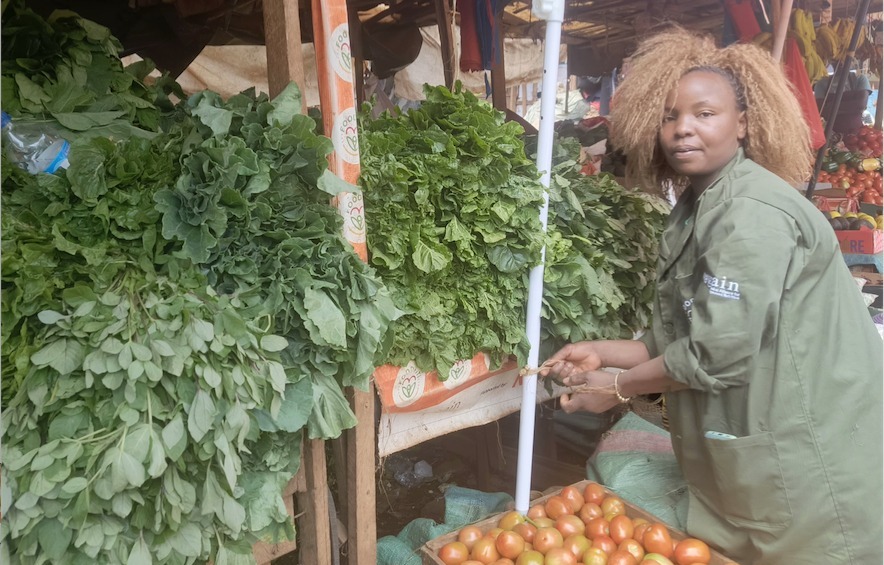

In Kiambu county, food safety is no longer just a concern for the government but a collective responsibility.
Farmers, traders and nutrition advocates are working together to ensure vegetables on Kenyans tables are not just fresh, but also safe and nutritious.
Amid growing concerns over non-communicable diseases and poor dietary choices, this collaboration is transforming how food is grown, handled and consumed, right from the farm to the fork.
Leah Oranga, a vegetable farmer from Kagongo village in Ndenderu ward, Kiambu county, grows a variety of indigenous vegetables including cowpeas, kunde, spinach, terere and managu.
She is among many farmers who have been trained on the importance of adopting good agricultural practices to ensure their produce is of high quality and safe for consumption.
“I avoid using chemical fertilisers and instead practice organic farming to ensure the safety of my vegetables,” she says.
Oranga relies on irrigation and regenerative agriculture to keep her crops green and healthy throughout the seasons.
“We have peak months when vegetables are scarce in the market and that’s when we sell,” she said. “We harvest in June so that by August, when supply is low, we can meet the demand. We also harvest in October and plant again in January or February.”
Before planting, she conducts soil tests to assess fertility and suitability for cultivation. “Experts guide us on what improvements to make based on the test results,” she says.
To nourish her crops, Oranga uses slurry from her biodigester as manure, further avoiding chemical inputs.
She sells her vegetables directly to traders at the farm gate, earning about Sh20 per kilo.
Not far from her farm in Ruaka, Anthony Kuria is a vegetable trader, supplying fresh produce to market vendors. His day begins at 6:30 am, collecting vegetables directly from farmers. When local supply is low, he sources from other areas like Kimende, Soko Mjinga, Kinari, Ndeiya, Limuru, Zambezi and Wangige, all in Kiambu county.
Kuria deals in a range of leafy greens such as spinach, sukuma wiki, kunde, kanzera, saga, managu, terere, mito and kahurura. “Food safety is critical,” he said. “I buy from farmers who avoid chemical pesticides and use manure instead. Most have been trained in safe farming practices.”
To prevent contamination, Kuria stores and displays his vegetables in clean crates and barrettes. “I never place produce on the ground,” he notes. “Clean handling from the farm to the market is key.”
On a good day, Kuria earns up to Sh40,000 from vegetable sales, supplying to about 60 women who resell in local markets and a few customers who buy for household consumption.
According to Adams Mutai, Project Coordinator of the Vegetables for All initiative by the Global Alliance for Improved Nutrition, vegetable consumption remains below WHO’s recommended daily intake of 400 grammes per person. “Currently, we are averaging only 120 to 150 grammes,” he said.
The Vegetables for All is a five-year Dutch-funded project being implemented in Kiambu, Nairobi, Machakos, Nakuru and Mombasa. It promotes increased consumption of leafy greens, vegetable ingredients and flavour vegetables.
“One goal is to reduce the triple burden of malnutrition while curbing the rising cost of non-communicable diseases,” Mutai said.
“These are diet-related issues that could be mitigated by eating more nutritious, safe vegetables.”
He said this year’s World Food Safety Week, is central to their work and they are working towards improving diets, one vegetable at a time.
“We are working with partners like Kephis and CropNuts to conduct maximum residue level tests on market vegetables, with support from county agriculture, trade and health departments,” Mutai said.
The project also trains farmers on good agricultural and regenerative practices and also reaches last-mile vendors, commonly known as mama mbogas on food hygiene.
So far, over 2,300 vendors in Kiambu have received training on proper vegetable handling and stall hygiene.
“We also educate consumers on how to mix, clean and prepare vegetables properly to retain nutrients,” he says. “Vegetables are cheap, nutrient-rich and low in calories. They help fight conditions like obesity, hypertension and micronutrient deficiencies, especially in urban and peri-urban areas.”
Public health officer Victor Kariuki points out that vendors must maintain cleanliness in personal hygiene and their selling environments. “They should have clean aprons, neat hair and nails, and a sanitary working space,” he said, adding that, “Sprayed vegetables must observe the 14-day withdrawal period before sale.”
Karuri Municipality trade development officer Stella Mugo adds that they also train vendors on basic business and communication skills. “We encourage traders to work closely with their suppliers for timely delivery of fresh, quality produce.”
Mutai notes that anything unsafe for consumption is no longer food, it’s poison. "Let’s commit to keeping our vegetables safe and nutritious from the soil to the plate. A healthy nation is a wealthy nation."








![[PHOTOS] OCS Samson Talam’s day in court](/_next/image?url=https%3A%2F%2Fcdn.radioafrica.digital%2Fimage%2F2025%2F06%2F458bc8b8-2cb6-4276-84d0-8f30cf301f52.jpg&w=3840&q=100)


